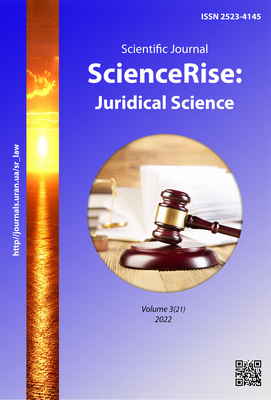Development of European electoral and referendum law
DOI:
https://doi.org/10.15587/2523-4153.2022.265570Keywords:
European electoral law, European referendum law, armed aggression, national legislationAbstract
The purpose of the article is to study European electoral and referendum law. In order to achieve it, it is necessary to solve the following tasks: disclosure of the nature of European electoral and referendum law; analysis of existing European legal standards in this field; highlighting the trends and regularities of the development of European electoral and referendum law in modern conditions. The methodological basis of the research is general scientific methods, in particular, dialectical, systemic, synthesis method, etc., and special legal (comparative-legal, historical-legal, formal-logical, structural-functional, legal semiotics, etc. .) methods of scientific knowledge. Their combination made it possible to comprehensively analyze the essence and peculiarities of European electoral and referendum law, to find out the trends and prospects of their development in modern conditions.
With the creation of an extensive system of international legal standards of the universal and regional (mostly European) levels, which guarantee the rights of citizens to participate in elections and referendums, the active functioning of the Council of Europe, the OSCE, the EU, the traditional democratic institutions of elections and referendums are marked by significant modernization and standardization. Along with the development of electoral and referendum law and relevant legislation at the domestic levels, the formation of European electoral and referendum law is observed. Undoubtedly, thorough studies of their nature and essence, subject-functional and other characteristics, mechanisms of implementation of existing European legal standards in this field, etc., are necessary. The risks and threats, associated with armed aggression against Ukraine, and the re-creation of classic institutions of people's power, for the improvement of which the efforts of democratic states and, in recent decades, international organizations have been concentrated, force the development of effective tools for countering and preventing manipulation of elections and referenda, establishing responsibility for such acts, increasing universally binding (normative) acts, along with "soft law" acts in this area
References
- Afanasieva, M. V. (2004). Konstytutsiino-pravove zabezpechennia vyborchykh tekhnolohii v Ukraini. Odesa, 20.
- Afanasieva, M. V. (2014) Vyborcha inzheneriia v Ukraini. Odesa: Yurydychna literatura, 384.
- Kofman, B. Ya. (2011). Mizhnarodni vyborchi standarty ta yikh implementatsiia v zakonodavstvo Ukrainy. Mariupol, 24.
- Korniienko, V. O. (2021). Yevropeiski vyborchi standarty ta konstytutsiino-pravove rehuliuvannia mistsevykh vyboriv v Ukraini. Odesa, 223.
- Nesterovych, V. F. (2018). Vyborche pravo yak pidhaluz konstytutsiinoho prava Ukrainy. Pravo i suspilstvo, 3, 44–49.
- Nesterovych, V. F. (2020). Vyborcha kampaniia: slovnyk slenhovykh terminiv ta vyraziv. Kyiv: Lira-K, 648.
- Kliuchkovskyi, Yu. B. (2018). Pryntsypy vyborchoho prava: doktrynalne rozuminnia, stan ta perspektyvy zakonodavchoi realizatsii v Ukraini. Kyiv: Vaite, 908.
- Pohorilko, V. F., Fedorenko, V. L. (2009). Referendne pravo Ukrainy. Kyiv: Vyd-vo «Lira», 366.
- Stefanchuk, R. O., Fedorenko, V. L., Yanchuk, A. O. (2022). Fake referendums and distorted are tools of russian military aggression against Ukraine and Western democracy. Ekspert: paradyhmy yurydychnykh nauk i derzhavnoho upravlinnia, 4 (22), 11–39.
- Fedorenko, V., Nesterovych, V. (2020). «Soft Law» in the Mechanism of the International and National Protection of the Constitutional Electoral Rights. Krytyka Prawa, 12 (3), 178–195. doi: http://doi.org/10.7206/kp.2080-1084.402
- Skrypniuk, O. V.; Shemshuchenko, Yu. S. (Red.) (2013) Teoriia konstytutsii Ukrainy. Problemy teorii konstytutsiinoho prava Ukrainy. Kyiv, 616.
- Didenko, O. M. (2022). Constitutional and legal guarantees of the right to elect and be elected to state authorities and local self-government in Ukraine. Kyiv, 222.
- Sarkisian, V. M. (2021). Konstytutsiino-pravovi zasady hromadskoho kontroliu za vyboramy v Ukraini. Kyiv, 254.
- Yevropeiska komisiia za demokratiiu cherez pravo (Venetsianska komisiia) (2011). Available at: https://www.venice.coe.int/webforms/documents/default.aspx?pdffile=CDL-AD(2011)003rev2-ukr
- Kliuchkovskyi, Yu. (Ed.) (2009). Yevropeiskyi demokratychnyi dorobok u haluzi vyborchoho prava. Materialy Venetsianskoi Komisii, Parlamentskoi Asamblei, Komitetu Ministriv, Konhresu mistsevykh i rehionalnykh vlad Rady Yevropy. Kyiv, 500.
- Kerivni pryntsypy dlia konstytutsiinykh referendumiv na natsionalnomu rivni CDL-INF (2001) 10. Available at: https://www.venice.coe.int/webforms/documents/default.aspx?pdffile=CDL-INF(2001)010-ukr
- Kodeks nalezhnoi praktyky shchodo referendumiv CDL-AD (2007) 008rev. Available at: http://www.venice.coe.int
- Kaminska, N. V. (2013) Yevropeiska systema mistsevoho i rehionalnoho samovriaduvannia (mizhnarodno-pravovi zasady stanovlennia, funktsionuvannia ta rozvytku). Kyiv, 474.
- Council of Europe leaders condemn the illegal annexation of occupied territories of Ukraine (2022). Available at: https://www.coe.int/en/web/kyiv/-/council-of-europe-leaders-condemn-the-illegal-annexation-of-occupied-territories-of-ukraine
- Shaptala, N., Kaminska, N. (2022). State Policy of Ukraine on Temporarily Occupied Territories: Problems of Conceptualization In Modern Scientific Discourse. Fìlosofsʹkì Ta Metodologìčnì Problemi Prava, 23(1), 57–69. doi: https://doi.org/10.33270/01222302.57
- Pro nikchemnist psevdoreferendumiv na tymchasovo okupovanykh terytoriiakh Ukrainy (2022). Postanova Tsentralna vyborcha komisiia No. 101. 27.09.2022. Available at: https://zakon.rada.gov.ua/laws/show/v0101359-22#Text
- Minakov, M. (2022). Referendum as Violence and Humiliation in Southeastern Ukraine. Available at: https://www.wilsoncenter.org/blog-post/referendum-violence-and-humiliation-southeastern-ukraine
Downloads
Published
How to Cite
Issue
Section
License
Copyright (c) 2022 Nataliia Kaminska

This work is licensed under a Creative Commons Attribution 4.0 International License.
Our journal abides by the Creative Commons CC BY copyright rights and permissions for open access journals.
Authors, who are published in this journal, agree to the following conditions:
1. The authors reserve the right to authorship of the work and pass the first publication right of this work to the journal under the terms of a Creative Commons CC BY, which allows others to freely distribute the published research with the obligatory reference to the authors of the original work and the first publication of the work in this journal.
2. The authors have the right to conclude separate supplement agreements that relate to non-exclusive work distribution in the form in which it has been published by the journal (for example, to upload the work to the online storage of the journal or publish it as part of a monograph), provided that the reference to the first publication of the work in this journal is included.








